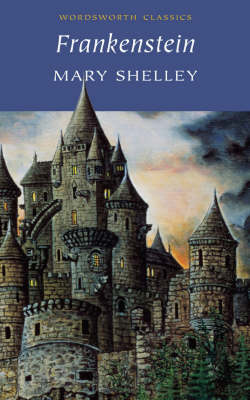Nothing is more powerful than a moment you truly connect with someone. I’m not talking on a romantic level, but just in general. Connecting with someone who shares your beliefs or passions. You feel like a part of you that is so misunderstood is now deeply appreciated.
 |
| Image courtesy of Wordsworth Classics |
Sometimes, it’s hard for me to explain to people exactly what I want out of life, and that can make me feel lonely. But I had a refreshing feeling when I picked up Mary Shelley’s Frankenstein for a quick read for my English class. As I began reading Robert Walton’s letters at the beginning of the book, I strangely identified with him on a on a level that I never expected. As Walton begins the story, he writes to his sister, talking about the adventures he’s going on and the dreams he has of accomplishing something much bigger than himself. At the beginning, his letters sound grand and optimistic. As a reader, I pictured Robert as this valiant character who will stop at nothing to live his dreams.
But in the second letter, I saw a deeper side of Robert. The part of his letter that resonated with me, that made me realize that I weirdly had so much in common with this 18th century male explorer, was when he said, “I have no one near me, gentle yet courageous, possessed of a cultivated as well as of a capacious mind, whose tastes are like my own, to approve or amend my plans.”
Yes, that was borderline old English. But basically what Walton is trying to tell his sister is that none of his shipmates understand his dreams. They are below him. All they know is sailing and working and sailing and working. A routine lifestyle. Robert’s dreams are bigger than theirs. And now it hurts that he can’t share them with anyone.
Because I related to Walton so much, it made me a little worried. At the end of
the story, Walton gives up his dreams and goes back to England. He sounds so
defeated when he ends his letters with, “I am returning to England. I have lost
my hopes of utility and glory;-- I have lost my friend.”
Is that what life is? You dream and dream and then you get stuck with people you can’t connect with and that forces you to give up? You work and pine and you get nothing? That idea scared me. To see the big, heroic dreamer that I loved from the beginning of the book turn into a defeated coward was very unsettling. I wanted the character I connected with to have all the glory. Because if he could do it, maybe I could too. |
| I feel like Robert Walton would have hung this poster in his cabin. |
I wanted to
feel that connection that I missed so much. I wanted to realize someone respected
and appreciated me because they could relate to my passions. I wanted someone
to know me almost as well as I knew myself.
Well, it turns out, I still haven’t found my place. And I really don’t have many people who I think truly understand me. But that’s okay because Walton taught me that you can’t go looking for the people that are going to matter to you. No one understands your dreams as well as you do, so sometimes you have to realize things on your own. Because Walton didn’t find his place on his ship he traveled on for so long, it ended up taking his life in another direction; What I think was the right direction all along.
So, each time I struggle trying to
fit in or begging people to understand what I want out of life, I realize now
that it only strengthens my character. The people I meet (or do not meet) and
the struggles I endure are what’s going to allow me to know myself better and
guide me in my life’s direction. And I know that once I get there, I will have
plenty of people to connect with, on a meaningful level, much like I did with
Walton last week in the library.


